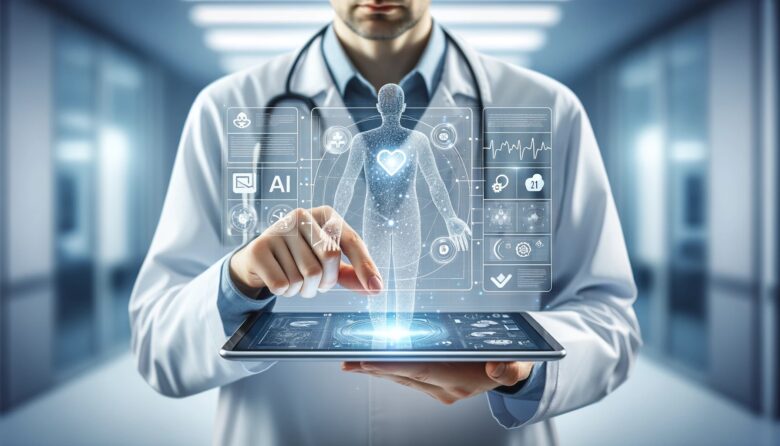Artificial intelligence (AI) is transforming almost every field, but healthcare is one of the most significant. AI in medicine uses intelligent technology, machine learning, and data analytics to help doctors identify the causes of patients’ illnesses, develop treatment plans, and ensure overall recovery.
AI can process vast amounts of medical data incredibly quickly, uncovering patterns and early warning signs that even experienced professionals might miss. This is in stark contrast to previous approaches. This makes AI a crucial tool for doctors, researchers, and patients, enabling better prevention, faster diagnoses, and more personalised care.
AI Supports Customised Care Plans:
Creating personalised health and exercise plans is one of the most intriguing applications of AI in healthcare. AI offers customised recommendations based on a person’s medical history, lifestyle, genetic information, and real-time health data.
AI can analyse data from fitness trackers, health apps, food diaries, and electronic medical records to develop personalised exercise programmes, diet plans, and stress management strategies. This level of customisation ensures that health goals are achievable and sustainable.
Using AI to Improve Diagnostic Accuracy:
AI has made remarkable progress in improving diagnostic accuracy. Systems trained on millions of medical images and medical records can detect conditions such as cancer, heart disease, and neurological disorders with astonishing accuracy.
For example, AI imaging technology can detect subtle problems in MRI or CT scans that are difficult for the human eye to detect. This capability enables faster patient diagnoses, quicker treatment, and better outcomes, while reducing the risk of misdiagnosis.
Remote Health Monitoring and Virtual Assistants:
AI-powered virtual health assistants and remote monitoring devices are changing the way people approach their healthcare at home. Smartphones and wearables can record vital signs such as heart rate, blood pressure, blood oxygen levels, sleep quality, and activity level.
Analyzes this information and immediately alerts healthcare providers to potential health risks. This technology can sometimes alert healthcare providers immediately, so they can receive immediate care. Virtual assistants can also assist with appointments, medication reminders, and even insurance processing.
AI-Powered Tools for Mental Health:
AI also helps with mental health. Therapy apps and chatbots can help you manage your emotions, practice mindfulness, and do guided meditations, day and night.
AI tools cannot replace professional treatment, but they can be a beneficial starting point for people suffering from anxiety, stress, or depression. Users can also use these tools to track their mood swings, identify causes, and develop coping strategies.
Accelerating Drug Development and Medical Research:
Normally, developing a new drug can take years, but AI can significantly accelerate the process. AI can identify viable drug candidates by analysing massive datasets. It can also predict the effectiveness of these drugs and even identify potential side effects before clinical trials begin.
AI can also help researchers discover connections between genes, diseases, and treatments, potentially leading to significant advances in personalised medicine. This acceleration means that patients have faster and safer access to new medicines.
Predictive Healthcare Models:
One of the advantages of AI in healthcare lies in its predictive power. AI can predict potential health problems by analysing a patient’s medical history, lifestyle, and genetic predispositions.
For example, AI can predict your likelihood of developing diabetes, heart disease, or other chronic conditions within a given timeframe. This empowers patients and doctors to take steps to protect their health, making healthcare a proactive rather than reactive system.
How Intelligent AI Systems Are Transforming Fitness:
Advances in AI are also contributing to fitness. Virtual AI fitness coaches can adjust workout plans in real time based on a user’s performance, fitness level, and goals.
These tools provide rapid feedback on your training style, intensity, and pace, helping you prevent injuries and achieve better results. Whether you’re training for a marathon or simply want to get into shape, AI can make training more efficient, engaging, and personalised.
The Future of AI in Healthcare:
AI is only at the beginning of its transformation of healthcare. Future systems could provide real-time, highly detailed health assessments, enhance emotional intelligence in patient interactions, and provide better surgical assistance.
As technology advances, AI will empower people to take greater control over their health by enabling faster diagnoses, better disease prevention recommendations, and personalised treatment plans.
Conclusion:
AI is transforming healthcare in ways once thought impossible. With personalised treatment plans, more accurate diagnostics, mental health support, and predictive care models, AI is making healthcare smarter, faster, and more successful.
By combining big data with intelligent algorithms, AI is enabling healthcare to be more preventative and patient-focused. We expect AI to play an increasingly important role in daily health and well-being as new concepts emerge.
FAQs:
1. How is AI used in medicine?
In healthcare, AI is used to detect diseases, develop treatment plans, monitor patients, and perform predictive analytics. This helps clinicians make faster and more accurate decisions.
2. Can AI improve patient outcomes?
Yes. AI can significantly improve recovery rates and overall patient health through early diagnosis, personalised treatment, and continuous patient monitoring.
3. Will AI replace doctors?
No. AI helps healthcare professionals by providing data-driven insights, but they still need to be able to diagnose and treat patients.
4. Is it safe to use AI for mental health?
AI apps for mental health can provide basic emotional support, but they cannot replace certified therapy for serious conditions.
5. What role will AI play in healthcare in the future?
In the future, we may see more personalised preventive treatments, real-time diagnostics, and advanced surgical assistance.
Source:
- World Health Organisation – Applications of Artificial Intelligence in Healthcare
- National Institutes of Health: Applications of Artificial Intelligence in Medical Research
- Mayo Clinic: Artificial Intelligence and Diagnostic Accuracy



